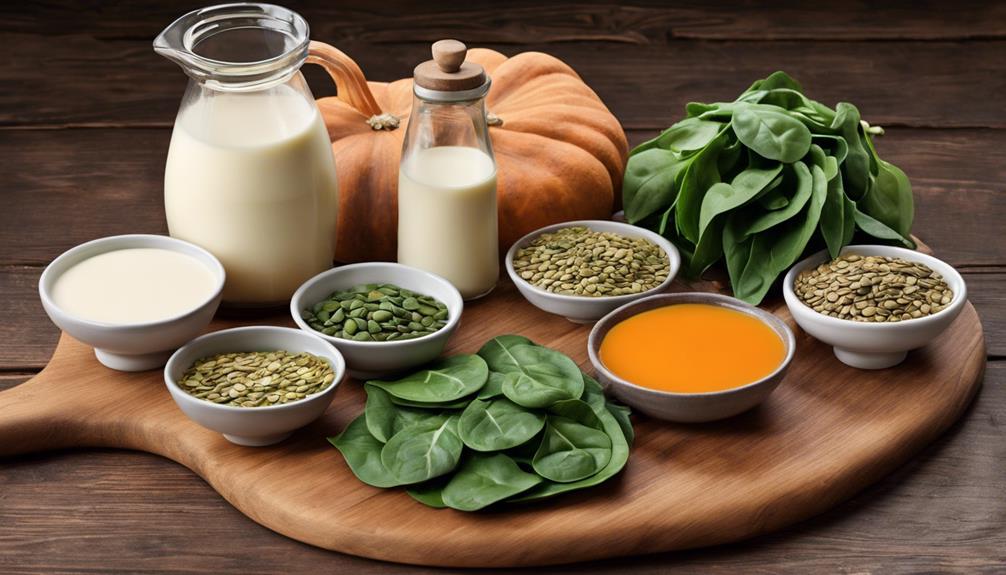When it comes to navigating the world of postpartum nutrition, we've all heard our fair share of 'expert' advice. But what if we told you there's a concise list of high-quality breastfeeding diet tips that could make a real difference in your journey as a new mom?
These tips go beyond the generic suggestions and explore into practical strategies tailored to support both you and your little one. Let's uncover the secrets to nourishing your body and optimizing your breastfeeding experience – trust us, you won't want to miss out on these essential insights.
Key Takeaways
- Hydration is crucial for postpartum recovery and milk production.
- Nutrient-dense foods like protein, colorful fruits, and whole grains are essential.
- Balancing macronutrients of carbohydrates, proteins, and healthy fats supports milk production.
- Incorporate iron-rich foods and omega-3 fatty acids for energy, brain development, and overall health.
Hydration Is Key
Staying well-hydrated is important for breastfeeding moms, as adequate fluid intake directly impacts postpartum recovery and milk production. During breastfeeding, our bodies require extra fluids to support the increased demands of milk production. It's recommended to drink at least 8 cups of water daily to maintain hydration levels. In fact, aiming for about 128 ounces of fluids from all sources each day can help us stay adequately hydrated. Dehydration is a real concern for breastfeeding moms, as it can lead to health issues like urinary tract infections and fatigue, hindering our postpartum recovery.
To prevent dehydration, listening to our bodies and drinking water whenever we feel thirsty is crucial. By keeping a water bottle nearby while breastfeeding or setting reminders to drink throughout the day, we can make sure that we're meeting our fluid intake needs. Prioritizing hydration not only supports our overall well-being but also contributes to the health and growth of our little ones.
Nutrient-Dense Foods to Include

To support ideal postpartum recovery and milk production, breastfeeding moms should prioritize incorporating nutrient-dense foods into their diet. Here are essential foods to include:
- Protein-Rich Foods: Include lean meat, poultry, fish, eggs, dairy, beans, nuts, and seeds for muscle repair and growth.
- Colorful Fruits and Vegetables: Consume a variety to provide essential vitamins, minerals, and antioxidants for overall health and immunity.
- Whole Grains: Incorporate whole wheat bread, brown rice, oats, and quinoa for sustained energy and fiber.
- Healthy Fats: Opt for sources like avocados, nuts, seeds, and olive oil to support brain development in infants.
These foods not only nourish the mother but also benefit the breastfeeding baby by providing the necessary nutrients for growth and development. By incorporating a balanced variety of protein-rich foods, colorful fruits and vegetables, whole grains, and healthy fats, breastfeeding moms can make certain they're meeting their nutritional needs while supporting their little ones' health and well-being.
Balancing Macronutrients
Balancing macronutrients is essential for breastfeeding moms as it involves consuming adequate amounts of carbohydrates, proteins, and fats to support both milk production and maternal health.
Carbohydrates play a critical role in providing energy for breastfeeding mothers, and it's recommended to source them from whole grains, fruits, and vegetables.
Proteins are important for tissue repair and growth, making it significant to include lean meats, dairy, beans, and nuts in your diet.
Additionally, healthy fats such as avocados, nuts, and seeds are essential for brain development in infants and hormone regulation in mothers.
Importance of Iron-Rich Foods

Iron is a vital nutrient for breastfeeding moms like us, as it aids in maintaining energy levels, boosting the immune system, and supporting the baby's growth.
Including iron-rich foods such as lean meat, poultry, fish, and beans in our diet is important to prevent iron deficiency anemia and guarantee excellent health during breastfeeding.
Iron for Energy
Ensuring an adequate intake of iron-rich foods is essential for maintaining energy levels and overall health while breastfeeding.
Including lean meats, such as poultry and fish, along with beans, lentils, and fortified cereals in your diet can help meet your iron needs. Iron deficiency can lead to fatigue and decreased milk production in breastfeeding moms, making it vital to incorporate plant-based sources like spinach, tofu, quinoa, and pumpkin seeds.
If you struggle to get enough iron from food alone, consulting with a healthcare provider about iron supplements is recommended to support your energy levels and overall well-being during this demanding time.
Boosting Immune System
To optimize our immune system while breastfeeding, it's important to focus on incorporating a variety of iron-rich foods into our daily meals. Iron plays a critical role in supporting our immune health, and as breastfeeding moms, we require extra iron for both our well-being and our baby's development.
Include foods such as lean meats, poultry, fish, beans, lentils, and fortified cereals in your diet to meet your iron needs. Additionally, prioritize iron-rich options like spinach, tofu, quinoa, and pumpkin seeds to prevent fatigue and enhance immunity. Pairing these foods with vitamin C-rich options like citrus fruits and bell peppers can boost iron absorption in the body.
Ensuring adequate iron intake is key for sustaining energy levels, cognitive function, and overall health during the breastfeeding journey.
Vital for Growth
When focusing on our diet as breastfeeding moms, including a variety of iron-rich foods is essential for supporting our baby's growth and development. Iron is vital for brain development and overall growth, making it an essential nutrient during lactation. Here are important points to keep in mind:
- Breast milk contains low iron levels, highlighting the need for iron-rich foods in our diet.
- Lean meats, poultry, fish, legumes, and dark leafy greens are excellent sources of iron for us as lactating mothers.
- Iron deficiency can lead to fatigue, weakness, and decreased milk production, underscoring the importance of meeting our iron needs.
- Enhance iron absorption by incorporating vitamin C-rich foods like citrus fruits into your meals.
Omega-3 Fatty Acids for Brain Development

Incorporating omega-3 fatty acids into a breastfeeding diet supports important brain development in infants. Omega-3s, particularly DHA, play a vital role in the growth and function of the baby's brain. Breast milk naturally contains DHA, making it essential for infants' cognitive and visual development. Consuming fish rich in omega-3s like salmon, mackerel, and sardines can enhance the DHA content in breast milk, providing additional benefits to the baby.
To highlight the significance of omega-3 fatty acids for brain development, consider the following table:
| Omega-3 Fatty Acids Benefits for Infants |
|---|
| Supports brain growth and function |
| Enhances cognitive development |
| Aids in visual development |
Ensuring an adequate intake of omega-3 fatty acids in the breastfeeding diet not only benefits the baby's brain development but also contributes to their overall health and well-being. By including foods rich in omega-3s, mothers can positively impact their child's future cognitive abilities and visual acuity.
Avoiding Foods That Cause Discomfort

Avoiding discomfort-causing foods is important for mothers who are breastfeeding to guarantee their babies' well-being and comfort. Certain foods like dairy, caffeine, cruciferous vegetables, and spicy foods can cause discomfort in some breastfeeding babies.
Symptoms of discomfort in babies may include gassiness, fussiness, colic, or changes in bowel movements. Keeping a food diary can help identify specific foods that lead to discomfort in breastfeeding infants. Eliminating suspected trigger foods for a period can help determine if they're causing discomfort in the baby.
Consulting a healthcare provider or a lactation consultant can provide guidance on identifying and avoiding foods that cause discomfort in breastfeeding babies. It's essential to pay attention to what we eat to make sure our little ones are happy and healthy while breastfeeding.
Managing Caffeine and Alcohol Intake

When breastfeeding, it's important to be mindful of our caffeine and alcohol intake. Limiting caffeine to 1-2 cups per day can help prevent overstimulation in the baby.
Moderation is key when it comes to alcohol consumption, with no more than 1 drink per day recommended for breastfeeding mothers.
Caffeine: Moderation Is Key
Managing caffeine intake while breastfeeding requires moderation to guarantee the well-being of both the mother and the baby. It's important to be mindful of how much caffeine you consume as it can have a direct impact on your little one's sleep patterns.
Here are some essential tips to help you navigate caffeine intake during breastfeeding:
- Limit caffeine intake to 1-2 cups per day to prevent potential agitation in the baby.
- Wait at least 2-3 hours after consuming caffeine before breastfeeding to minimize its effects on the baby.
- Maternal caffeine consumption can impact the quality of sleep in breastfeeding infants.
- Moderation is key when it comes to managing caffeine intake while breastfeeding for both mother and baby's well-being.
Alcohol: Limit Consumption Wisely
Limiting alcohol consumption while breastfeeding to no more than one drink per day is crucial for ensuring the well-being of both the mother and the baby. To minimize the baby's exposure, it's best to time alcohol consumption just after breastfeeding or pumping.
Remember to wait at least 2 hours before breastfeeding or pumping again to allow for alcohol clearance from breast milk. Although the amount of alcohol in breast milk is lower than in maternal blood, it can still affect the baby.
Hydration: Balance With Liquids
Staying adequately hydrated is important for supporting milk production and promoting postpartum recovery. It emphasizes the importance of balancing fluids intake effectively, especially when managing caffeine and alcohol intake.
When it comes to hydration, here are some key points to take into account:
- Monitor Fluid Intake: Aim for about 128 ounces of fluids daily from all sources, excluding sugary drinks like soda.
- Limit Caffeine Intake: Keep it to 1-2 cups per day to prevent excessive transfer to breast milk and potential agitation in the baby.
- Manage Alcohol Consumption: Limit to no more than 1 drink per day, timing consumption just after breastfeeding or pumping.
- Consult Healthcare Provider: Seek specific recommendations on caffeine and alcohol intake while breastfeeding to make sure the best outcomes for you and your baby.
Ensuring Sufficient Calcium Intake

Ensuring an adequate intake of calcium, with a target goal of approximately 1,000 milligrams per day, is essential for supporting bone health during the breastfeeding period. Calcium plays a crucial role in maintaining strong bones for both the mother and supporting the baby's bone development.
Incorporating dairy products like milk, yogurt, and cheese into your diet provides a vital source of calcium. If you prefer plant-based options, fortified alternatives such as almond milk or tofu can also help meet your calcium needs. Including leafy green vegetables like kale and broccoli, as well as almonds, in your meals adds variety and nutritional value.
If meeting the daily calcium recommendation proves challenging, consider discussing the option of a calcium supplement with your healthcare provider to ensure you and your baby's bone health are well-supported during this important stage.
Incorporating Probiotics for Gut Health

To maintain prime gut health during breastfeeding, incorporating probiotics into your diet can be beneficial for both you and your baby. Probiotics are beneficial bacteria that can improve gut health and digestion, essential for overall well-being. Including probiotic-rich foods such as yogurt, kefir, sauerkraut, and kimchi can help maintain a healthy balance of gut flora, promoting a robust immune system. Additionally, probiotics may reduce the risk of mastitis, a common breastfeeding complication, by supporting the immune system. A healthy gut flora in moms can potentially lead to better absorption of nutrients, benefiting both mom and baby. Before considering probiotic supplements, it's important to consult with a healthcare provider to make sure they're safe and appropriate for you and your baby.
- Probiotics improve gut health and digestion.
- Probiotic-rich foods like yogurt, kefir, sauerkraut, and kimchi maintain a healthy balance of gut flora.
- Probiotics can help reduce the risk of mastitis by supporting the immune system.
- A healthy gut flora enhances the absorption of nutrients, benefiting both mom and baby.
Seeking Professional Guidance and Support

Professional guidance from lactation consultants or registered dietitians is essential for tailoring personalized breastfeeding diet recommendations. Seeking support from a healthcare provider can address any concerns or questions about your breastfeeding diet, making sure you and your baby receive top-notch nutrition.
These experts can help navigate dietary restrictions, allergy concerns, and overall diet quality during breastfeeding. Working with professionals guarantees that you meet your nutritional needs while breastfeeding, promoting both your health and your baby's well-being.
They can provide valuable insights into supplements, food allergies, and making informed choices about your diet. By collaborating with a lactation consultant or a registered dietitian, you can create a personalized plan that suits your unique needs and circumstances.
Don't hesitate to seek professional guidance and support to make your breastfeeding journey as smooth and nourishing as possible.
Frequently Asked Questions
What Is the Best Diet for Breastfeeding Mothers?
We believe the best diet for breastfeeding mothers includes nutrient-rich foods like protein sources, whole grains, fruits, and vegetables to support milk production. Consulting a healthcare provider for personalized dietary recommendations is essential for meeting nutritional needs.
What Is the Recommended Diet While Breastfeeding?
We should focus on consuming an extra 330 to 400 calories daily while breastfeeding to support milk production. Opt for nutrient-rich foods like whole grains, lean protein, fruits, and vegetables. Stay hydrated with water and limit sugary drinks and caffeine.
What Foods Should Breastfeeding Moms Avoid?
We avoid alcohol due to its harmful effects on our baby. Limiting caffeine to 2-3 cups daily helps prevent baby agitation. Being mindful of high-mercury seafood and common allergens like dairy, soy, wheat, and eggs protects our baby's health.
What Should I Eat to Lose Weight While Breastfeeding?
We focus on nutrient-dense foods like lean proteins, fruits, veggies, whole grains, and healthy fats for weight loss while breastfeeding. High-fiber foods promote satiety. Snack on nuts, seeds, yogurt, or veggies. Stay hydrated, watch portions, aim for balanced meals.
Conclusion
To sum up, following these 10 best breastfeeding diet tips can greatly benefit both mom and baby.
By staying hydrated, consuming nutrient-dense foods, and seeking professional guidance, moms can guarantee they're providing the best nutrition for their little ones.
Remember, a well-balanced diet is key for peak health and milk production.
So let's aim to nourish ourselves with the best foods possible, because our bodies are capable of amazing things!









